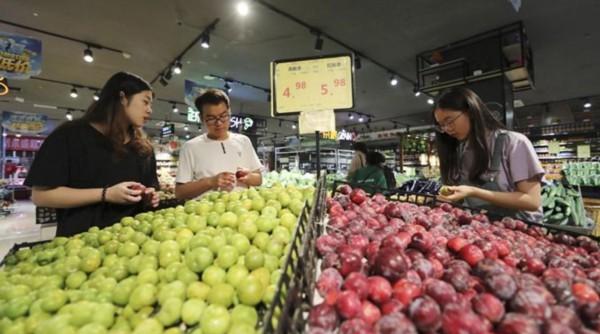(Health Times, Jing Xuetao)
According to incomplete statistics reported by various localities, Health Times found that the environmental specimens of imported fruits, outer packaging, or fruit stores in Chifeng City, Inner Mongolia, Hangzhou, Shaoxing, Taizhou, Lishui and other places in Zhejiang Province tested positive for the nucleic acid of the new coronavirus.

Profile picture. Fruit supermarket. Image from Xinhua News Agency.
On January 6, Songshan District, Chifeng City, Inner Mongolia, tested positive samples for the new coronavirus when a merchant conducted a nucleic acid test on Chilean imported cherries purchased from Gaobei store in Hebei Province. Chifeng City issued the latest notice saying that Chifeng has activated the "circuit breaker" mechanism, and the purchase and sale of imported fruits is temporarily prohibited throughout the city. Express delivery and logistics enterprises shall not receive, send or send imported cold chain food and imported fruits during the "circuit breaker" period.
Just a few days ago, the nucleic acid test results of imported fruits such as dragon fruit in many regions of Zhejiang also attracted social attention because of positive results.
At 7:40 on December 30, 2021, the Taizhou JiaojiangZhou Jun Fruit Wholesale Department had a batch of Vietnamese red heart dragon fruit outer packaging purchased from the Chia Tai Fruit Business Department of Jinhua Fruit Wholesale Market on December 26, which tested weakly positive for nucleic acid. After transfer, the batch of dragon fruit entered from Shanghai Waigaoqiao Port on December 17, and on the same day, the Jinhua Chia Tai Fruit Industry Business Department purchased the batch of 1737 boxes of fresh dragon fruit from Shanghai Yishuo Trading Co., Ltd.
On January 2, Longquan City, Lishui City, conducted nucleic acid testing on a batch of imported red heart dragon fruit purchased from Zongbao Fruit Wholesale Department in Jindong District, Jinhua City, Zhejiang Province, and the results were 1 weak positive, and the rest were negative.
On the same day, a batch of Songyang County, Lishui City, was purchased from Jinhua City Jindong District and the United States Agricultural Products Commercial Bank, and the batch of red heart dragon fruit imported for nucleic acid testing was carried out, and the initial screening results were 4 positive, and the rest were negative.
As of 19:10 on January 2, Jiangshan City has detected a cold storage ground environmental specimen positive for the new coronavirus nucleic acid at the Huage (Xiaohua) Boutique Fruit Store in Jiangshan Agricultural Trade City.
As of 12:00 on January 2, Chun'an County, Hangzhou City, has detected 12 nucleic acid tests positive for the inner and outer packaging of dragon fruit in Chun'an County Century Hualian Supermarket and Chun'an County Zhengyuan Fruit Co., Ltd., and the other 38 samples have been negative.
On January 2, two fruit shops in Baima Town, Pujiang County, Zhejiang Province, tested weakly positive for nucleic acid on the outer packaging of dragon fruit imported.
On January 3, after receiving a letter from Jinhua Jindong District in Shangyu District, Shaoxing City, a batch of Haishun brand dragon fruit imported from Vietnam was tested for nucleic acid and the results were positive.
Near the Spring Festival, many residents will choose to buy some imported fruits, can they still buy and eat with confidence? Feng Zijian, secretary general of the Chinese Preventive Medicine Association, once said that the positive test for new crown nucleic acid in imported goods only shows that it has been contaminated, which does not mean that it is necessarily contagious.
For the new crown virus to be contagious, it needs to have two characteristics: first, it must be a live virus; second, the viral load must be high enough. Imported cold chain fruits are positive, and a part of the virus on its surface may have turned into a dead virus during long-distance transportation, or just a nucleic acid fragment of the virus. This does not mean that it has a complete live virus on its surface and may not be contagious.